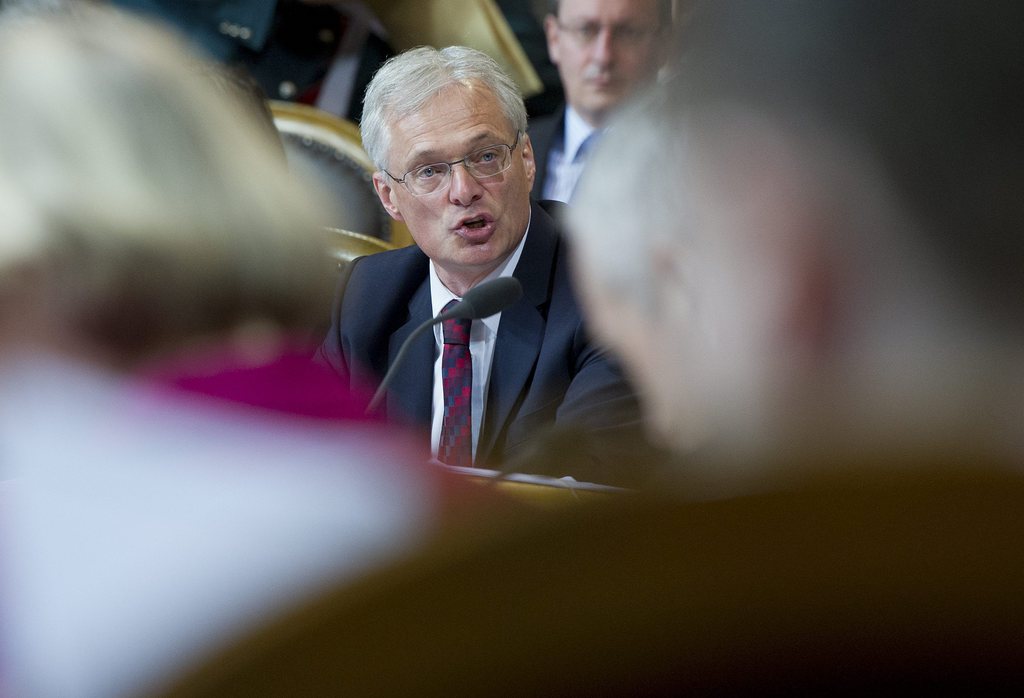“Fat cat” initiative’s trials and tribulations

Following a four-year political debate on fat cat bonuses, the Swiss public are in sight of having their say on the matter – provided they can work out the various proposals and counterproposals on offer.
On Thursday, parliament finally agreed on its response to the initiative launched by businessman-turned-politician Thomas Minder in 2008.
At some point before March 2013, voters could get the opportunity to clip the wings of high-flying executives and board members by giving shareholders the binding right to reject company remuneration plans.
Alternatively, the public could opt for a counterproposal to impose a new tax on the biggest executive pay-outs. A third option would be to reject both of these ideas and trust politicians to enact an indirect counterproposal – essentially a watered-down version of Minder’s text.
Minder, author of the original initiative, has been left thoroughly dejected by the four years of political debate and behind-the-scenes bargaining. He believes the final three-pronged alternative has forsaken the purpose of his initiative and has simply muddied the waters.
“This is the first time [this has happened] in the 121-year history of people’s initiatives,” he berated parliament on Thursday.
Rip-off debate
Excessive pay and bonuses of top company executives has been a hot topic in Switzerland, as in other countries, ever since the 2008 financial crisis plunged the world into recession.
The public has directed anger at the multi-million franc bonuses awarded to executives whose decisions have been blamed for the erosion or outright destruction of countless investments.
Minder swiftly found support for his initiative against “rip-off salaries” that would ban golden handshakes and parachutes while giving shareholders the right to reject the annual pay plans of listed companies.
Leftwing political parties also embraced the plan with some even suggesting it could have gone further.
Rightwing and centre-right politicians quickly took fright at Minder’s proposals, saying they would damage the international competitiveness of Swiss-based companies and thus ruin the economy.

More
People’s initiative
Varied options
But rather than risk a voter backlash by recommending an outright rejection of the initiative, opponents brought forward their own counterproposals.
One solution, accepted on Thursday, rejects Minder’s ideas totally but instead calls on voters to accept the idea of taxing companies for every individual bonus in excess of SFr3 million ($3.1 million). This would apply to all companies, not just those listed on the stock exchange.
Christian Levrat, leader of the centre-left Social Democrats, said the tax would give companies “further motivation” to clamp down on golden handshake and parachute payments.
He told swissinfo.ch that the idea would be a “concrete measure that would assist in the fight against inflated bonus payments”.
In March, a separate so-called indirect counterproposal was accepted by parliament. This would curtail, but not ban, one-off payments for arriving and departing executives and allow shareholders to opt for a consultative – rather than a binding – vote on remuneration policies.
The indirect nature of the proposal means it is unlikely to go to public vote, but would instead be left to parliament to fine-tune and enforce in law.
Vote not certain
While the counterproposals have been agreed in principle, they still need to be rubber-stamped by parliament on June 15.
And to cap it all, Minder himself is still unsure whether he will go through with the campaigning and an eventual vote.
Exhausted by four years of debate and dispirited by the political machine, Minder hinted that he could after all give in to demands to bin his initiative before it gets to the public.
“I can [still] say yes or no to the withdrawal of the initiative,” he told Friday’s edition of the Tages-Anzeiger newspaper.
The initiative to put an end to excessive executive pay and boost shareholder rights was handed in with more than 118,000 signatures in 2008.
Unions regularly complain that the gap between the pay of top managers and shop floor workers has been steadily increasing in recent years in Switzerland.
Minder’s initiative plans to allow shareholders to veto listed company pay plans, force pension funds to vote every year and reveal their voting patterns and to outlaw golden hellos and parachutes.
In 2010, Minder struck a deal with the strongman of the rightwing Swiss People’s Party Christoph Blocher and agreed to withdraw his initiative if parliament approved a reform of the shareholder law.
This plan was botched by the other main parties, which accused Blocher, a multi-billionaire businessman and former justice minister, of misleading voters.
A nationwide ballot on the issue is expected by March 2013 at the latest.
A recent poll by the Swiss Business Federation economiesuisse and GfS Bern found that 54% of the Swiss population were in favour of the Minder initiative while 30% preferred the bonus tax option.
The youth wing of the Social Democratic Party last year entered a separate initiative calling for the top company salary to be no more than 12 times that of the most lowly paid member of staff.
(With input from Sonia Fenazzi)

In compliance with the JTI standards
More: SWI swissinfo.ch certified by the Journalism Trust Initiative












You can find an overview of ongoing debates with our journalists here . Please join us!
If you want to start a conversation about a topic raised in this article or want to report factual errors, email us at english@swissinfo.ch.